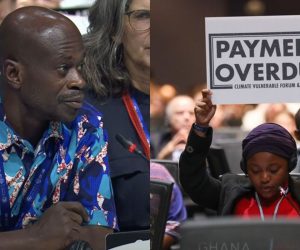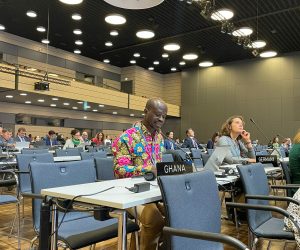
Climate Vulnerable Forum Leaders Dialogue COP26
4:15 – 6:15 pm 2 November 2021 – UNFCCC COP26, Glasgow, Scotland
Intervention of H.E. Mohamed Irfaan Ali
Hon. President of Guyana
Excellences, ladies and gentlemen.
I’m pleased to be joining this high level CVF. Our planet is ailing, human activity continues to pollute our land and contaminate or waterways while heat trapping greenhouse gases are warming the planet. Global temperatures are fast approaching a doomsday scenario. Our planet in turn is revolting, rising sea levels and extreme weather events are among its most rebellious eruptions. For climate vulnerable states, particularly small island developing and low-lying coastal states, the adverse effects of climate change are inflicting debt, destruction, and pain, and even worse, is threatening our very existence. Climate vulnerable states can be viewed through this lens, which emphasize our vulnerabilities, but we can also be viewed through another lens, one which highlights or ambitions. Small island developing and low-lying coastal states are not lacking in ambition. Many of us are already punching above our weight in response to the climate crisis.
We are the least contributors to climate change, yet we are making impactful contributions to mitigating the adverse effects of climate change. Through the ecosystem and climate services, which our forests provide and through the de-carbonization of our economies. No, we are not lacking in ambition, what constrains us is our ability to realize our ambitions. The Dhaka-Glasgow Declaration, which we will adopt today, is an unambiguous manifestation of our commitment to realize those ambitions. However, we cannot do so given the present barriers, which obstruct and constraint our efforts. If these barriers persist, then they will be real or actionable timeline in achieving not only ours, but a global climate change targets. This is why we have called for all the measures, which are incorporated in the Declaration, including the Climate Emergency Pact and helping with Climate Prosperity Plans to be implemented.
In Guyana we have experience of climate prosperity plans since 2009, when we were among the first developing countries to formulate a low carbon development strategy. Just last week we launched a consultative process in expanding our low carbon development strategy. This strategy when finalize will articulate our vision to 2030. Guyana will decarbonize its economy and will invest in low carbon opportunities and jobs while maintaining our standing forest, which is almost as big as England and Scotland combined. Our expansive forests are a global asset and store more than 20 gigatons of carbon. They preserve priceless biodiversity and provide sustainable livelihoods for people. We will continue to adopt an inclusive approach to the sustainable management of our forest, biodiversity, and fresh water supplies. We will slash emissions further by transitioning towards cleaner sources of energy. Yes, we are vulnerable, but we are not helpless or without hope. We are taking decisive action to ramp up and realize these ambitions, but without the critical support, financial and technological, our a best and noblesse of ambitions, will all flounder. The Dhaka-Glasgow Declaration is a proclamation of our commitment to being impactful in ending the climate crisis. I welcome it and endorse it.
On an ending note Madam Chair, over the last two days I have heard various numbers being announced in terms of the 100 billion pledge, and I want to sung a danger with the manipulation of these numbers. What we are seeing is actually a reclassification of development financing that was already there. Many of which had a very small component to deal with climate change, maybe a school with a solar system to produce the water, but now the entire loan is classified or the entire grant is classified as part of that 100 billion dollars. That is the sense we are having, and we must guard against this, that those resources were never meant to be part of the 100 billion dollars spread. So there needs to be accountability, there needs to be transparency, and there needs to be a proper system that speak directly to the pledges, where the pledges are coming from and exactly the timeframe that those pledges came in.
With these words. I thank you sincerely and I say to all of us let us continue the battle strong that has continued to be hopeful and hopefully the message will be hard.
Thank you.



